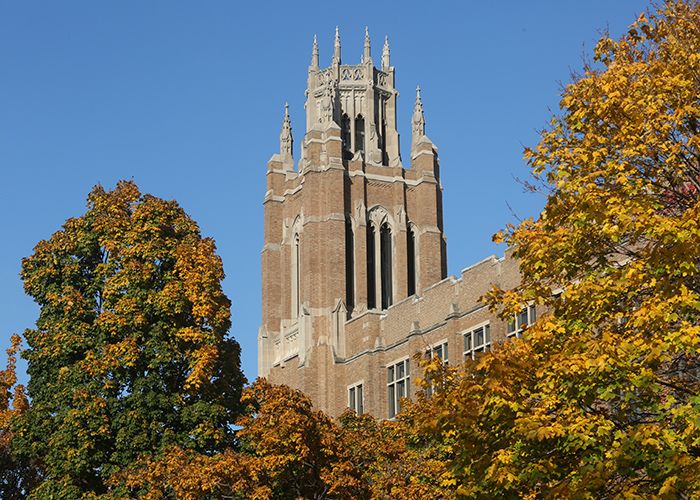2015 Teaching Excellence Awards
Dr. Philip Voglewede
Department of Mechanical Engineering
Dr. Philip Voglewede, associate professor of mechanical engineering, is an energetic instructor who is passionate about teaching and student learning. “My teaching goal is to create independent thinkers who are able to adapt to the constantly changing technological world in which we live,” said Voglewede.
Voglewede is constantly going the extra mile for his students. He holds daily office hours to ensure all his students have the opportunity to see him outside the classroom, conducts regularly organized problem-solving sessions and hosts Sunday night study sessions before final exams. According to Voglewede, feedback is a “two-way street,” which is why he distributes a mid-semester evaluation to seek feedback from his students on his performance
Voglewede’s extraordinarily high course evaluation scores reflect his students’ appreciation of his commitment to teaching excellence. “It’s important to note that he achieves these glowing reviews while teaching some of the most difficult classes we offer,” said a colleague.
While Voglewede continually pushes his students academically, he remains sensitive to their needs and skill level. “As educators, we need to find what motivates our students to achieve at a level they do not think they can achieve, and lift them to that level,” said Voglewede.
Dr. Andrew Starsky
Department of Physical Therapy
Dr. Andrew Starsky, clinical associate professor of physical therapy in the College of Health Sciences, has a unique approach to educating students across three different degree programs in the Department of Physical Therapy. From pulling out a guitar and singing a song about “gait analysis,” to learning all of his students’ names by the first week of class, Starsky’s students appreciate his engagement and dedication to their education.
Starsky fosters student learning through innovative, high-impact practices such as student research opportunities, collaborative student assignments, service learning and capstone projects.
“He provides students with a truly memorable educational experience, using a dynamic, engaging, innovative style of teaching to make learning interesting and especially long-lasting,” said a colleague.
“I am a strong believer in the value of a college education. I calculate how much the students are paying per hour of class, and give them a money back guarantee. I promise to make each hour worth it, or I will refund their tuition for that hour. Fifteen year of teaching and no refunds yet,” said Starsky.
Dr. Diane Dressler
College of Nursing
Diane Dressler, clinical assistant professor in the College of Nursing, is described by many as a “master teacher.” She was an early adopter of simulation technology and after educating future nurses for more than 16 years, Dressler continues to use this innovative teaching strategy. “I ask questions during the debriefing phase that prompt students to reflect on their performance and generate a deeper understanding of how the simulation experience can be applied to their practice,” Dressler said.
Dressler is equally supportive when it comes to mentoring, counseling and guiding new faculty members in the College of Nursing. “All of the faculty she has mentored have stated that Diane is a fantastic teacher and that they have benefitted greatly from her wisdom and guidance,” said Dr. Kerry Kosmoski-Goepfert, RN, associate clinical professor and associate dean for undergraduate programs.
“I love teaching our nursing students in the classroom, the simulation lab and in clinical settings,” Dressler said. “It is a privilege to impact the education of students who will help create the future of healthcare.”
Dr. Kristen Foster
Department of History
Dr. Kristen Foster, associate professor of history, is said to have the Jesuit characteristic of cura personalis in her DNA. “I like to think that my father passed along his love of both learning and teaching to me, and that in some small way, I have tried to mirror his tremendous commitment to the well-being and education of anyone who dares to open themselves fully to the process of learning,” said Foster.
Foster’s use of film clips, music and literature during her lectures give students a deeper look into the complex web of personalities, realities and intangibilities that drive historical events. “Dr. Foster cultivated a dynamic learning environment, never relying on any one type of teaching strategy, but instead utilized an array of strategies to create an environment that was conducive to spirited historical scholarship,” said a former student.
As a mentor and noted role model, Foster counsels students to discern a path that they may not have previously considered. Her enthusiasm for the subject not only sparks students’ interest on the topic, it has inspired many to pursue careers in history. “Whatever students choose to pursue in life, I want them to embrace and fearlessly question the world around them. I want them to remember to ask ‘why,’ and to choose the search for truth and meaning as often as they are able. In this way, their lives will be richer, and the world will be a better place,” said Foster.
